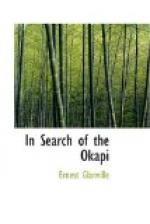“What says the wise woman, Muata?”
“Lion—not gorilla. Haw! We heard the story from the little men how the great one cleft the skull of the gorilla; and how they called you my father, after the man-monkey. But I told her you were more lion than ape, and she has judged for herself.”
Mr. Hume laughed, and held a hand to help the woman into the boat; but she stepped aboard unassisted, and moved forward, the jackal following very humbly.
“And the river-man?”
“He struck the trail of three man-eaters, and followed them, seeing red. Maybe he slew them and was slain, for there was much noise, and he did not return. So we here are all till we reach the hiding-place.”
The boat was pushed off, and Muata took one of the levers.
“Let the young lions sleep,” he said. “We can have no better watch than we now have. See! the jackal smelt you while you were still afar, and the chiefs wife heard the noise of the boat before I did. Wow! We are safe while they watch.”
“Does the chiefs wife smoke?” “Ow ay! tobacco would please her heart.” Mr. Hume passed a pipe and tobacco to the woman, and Compton gave her a lighted match. She took them as if they were ordinary objects of her life, lit the pipe, and by the flame of the match leant forward to peer into the boy’s face as she had stared at Mr. Hume. And she spoke a word or two before turning her face to the bows for the long watch.
“The river runs into the sea; but the river is always full. That is her word, young lion.”
“Which means?”
“I told her you were the white man’s son, and she has seen for herself. Maybe her words mean that when the father is gone the son takes his place. But in time you will know, for her meaning is sometimes hard to understand. Now sleep, you two, for there is great need for us ahead.”
Without more ado the two “young lions” rolled themselves in their blankets and enjoyed the rare luxury of an untroubled sleep, and when they awoke they were in a vast lagoon, out of which stood the bleached skeletons of dead trees, with gaunt bare branches, in all manner of fantastic shapes. But it was only the trees that were dead, for the astonished eyes of the boys rested on such a multiplicity of animal life as they had never before seen. Birds roosted on the aforesaid dead branches—sooty ibis, white pelicans, crows, kingfishers, and here and there, like sentinels on the topmost branches, a white-headed eagle, with his hooked bill, dominating the scene. Wheeling through the air were strings of duck and wisps of snipe in battalions, rows of cranes with their long legs trailing, and on the surface of the smooth water, on scores of small islands, formed originally by uprooted trees, and under the water, there were yet innumerable creatures. It was certainly grand hunting for all. There were flies and gnats for the frogs, tadpoles and the spawn of frogs for




